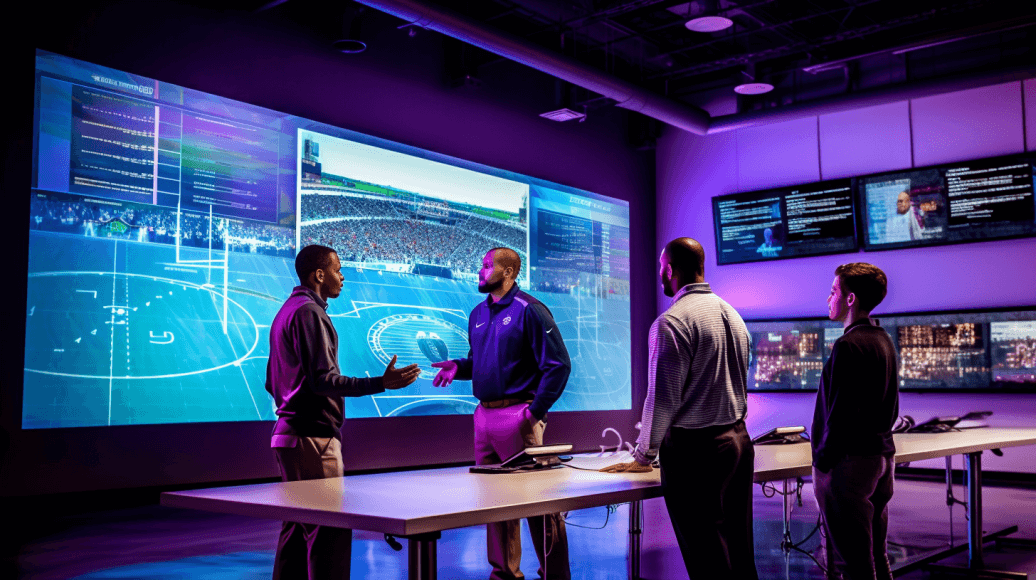Sports Project Manager Jobs require strong organizational and leadership skills. The project manager is responsible for planning, executing, and evaluating sports projects from start to finish.
They need to develop and manage project budgets, timelines, and resources effectively.
Additionally, they must have excellent communication and interpersonal skills to effectively collaborate with various stakeholders, including athletes, coaches, sponsors, and event organizers.
The ability to think strategically and problem-solve in a fast-paced and dynamic environment is also crucial for success in this role.
Sports project managers play a vital role in ensuring the successful delivery of sports projects and contribute to the growth and development of the sports industry.
Are you passionate about sports and have a knack for project management? If so, a career as a Sports Project Manager might be the perfect fit for you.
This role entails overseeing and coordinating various sports-related projects, from event planning to facility management.
In this article, we will explore the requirements, responsibilities, and job opportunities for Sports Project Managers, providing valuable insights for those interested in pursuing this exciting and dynamic profession.
What is a Sports Project Manager?
A Sports Project Manager is a professional who oversees and manages the various aspects of sports projects.
This includes organizing events, coordinating teams and resources, and ensuring the successful completion of projects within the given time frame.
They are responsible for planning, budgeting, and executing projects while ensuring effective stakeholder communication and collaboration.
With their expertise in sports management and project management, they play a crucial role in delivering successful sports projects.

Benefits of Being a Sports Project Manager
One of the advantages of working as a sports project manager is the opportunity to be involved in the planning and execution of high-profile sporting events.
This role offers numerous benefits for the project manager, sports fans, and the entire team involved in the projects.
Sports project management provides valuable experience in managing complex and dynamic projects, which can be applied to various industries.
The table below highlights some of the key benefits of being a sports project manager:
| Benefits | Explanation |
|---|---|
| Development of project management skills | Being involved in high-profile sporting events enhances the project manager’s professional reputation and opens new opportunities. |
| Opportunity to work with a passionate team | Sports project managers gain valuable experience planning, organizing, and executing projects. |
| Engagement with customers and sports fans | Interacting with customers and sports fans provides a unique opportunity to understand their needs and deliver memorable experiences. |
| Exposure to high-profile projects | Being involved in high-profile sporting events enhances the project manager’s professional reputation and opens doors to new opportunities. |
| Personal and professional growth | Sports project management challenges individuals to develop leadership, problem-solving, and communication skills, contributing to personal and professional growth. |
Requirements for Becoming a Sports Project Manager
To become a sports project manager, certain requirements must be met.
These requirements include having the necessary education and qualifications, possessing the required skills and experience, and possessing the necessary personality traits and other attributes.
Meeting these requirements is essential for individuals aspiring to excel in this role and effectively manage sports projects.
Education & Qualifications
Applicants for sports project manager jobs should possess a relevant degree and demonstrate a strong understanding of sports management principles.
In addition to a degree in sports management, applicants with backgrounds in engineering can bring a unique perspective to the role.
Here are three reasons why an engineering degree can be beneficial for a sports project manager:
- Expertise in project management: Engineering programs teach students to plan, execute, and monitor projects effectively. This knowledge can be directly applied to managing sports projects, ensuring they are well-organized and meet deadlines.
- Problem-solving skills: Engineering degrees require students to develop strong problem-solving abilities. As a sports project manager, identifying and addressing challenges during a project is crucial for successful delivery.
- Technical knowledge: Whether it’s electrical engineering, architectural engineering, or construction management, an engineering background equips individuals with technical knowledge that can be invaluable in overseeing sports projects involving complex infrastructure or facilities.
Skills & Experience Needed
Successful candidates for sports project management positions possess a diverse skill set and a track record of relevant experience in coordinating complex initiatives with multiple stakeholders.
A sports project manager must have a strong background in project management and possess excellent organizational skills to manage sports-related projects efficiently.
Additionally, knowledge of sports, such as rules, regulations, and industry trends, is crucial for effective decision-making and project planning.
An in-depth understanding of engineering and architecture principles is also important to ensure that sports facilities are designed and constructed to meet the needs of athletes and fans.
Moreover, the ability to work collaboratively with a team and lead them toward successful project completion is essential.
Experience in team development and management is highly valued in sports project management positions, as it ensures smooth coordination and communication among all stakeholders involved in the project.
Personality Traits Necessary
In addition to the required skills and experience, individuals in sports project management positions should possess a combination of personality traits that contribute to effective leadership and successful project outcomes.
These traits are crucial for navigating the fast-paced and complex world of sports project management.
Here are three key personality traits that are necessary for success in this field:
- Adaptability: Sports project managers must be adaptable to changing circumstances and be able to think on their feet. In a fast-paced environment, adjusting plans and strategies quickly is essential for meeting project deadlines and goals.
- Collaboration: Working with cross-functional teams is a common aspect of sports project management. Strong collaboration skills are needed to effectively communicate and coordinate efforts with individuals from different backgrounds and areas of expertise.
- Resilience: Sports project managers often face challenges and setbacks while working on innovative products or strategic projects. It is important to have the resilience and determination to overcome obstacles and keep pushing forward.
Sports project management allows one to contribute to cutting-edge projects and succeed in the industry with the right skills, experience, and personality traits.
Other Necessary Attributes
Other necessary attributes for individuals in sports project management include strong problem-solving skills and effective communication abilities.
In addition to these essential traits, a successful sports project manager must also possess a solid understanding of business operations and program management.
They should be proficient in project management techniques and methodologies and capable of overseeing various projects such as freelance sports projects, community sports participation projects, liability management projects, and adaptive reuse projects.
These diverse projects require a versatile skill set and the ability to adapt to different situations and challenges.
In possessing these attributes, sports project managers can open up a world of employment opportunities and contribute to the success of their organizations.
Ongoing professional development and a commitment to agile development methodologies are crucial for staying ahead in this dynamic field.
Job Description of a Sports Project Manager
A sports project manager oversees the planning, execution, and completion of sports-related projects.
This includes daily responsibilities such as coordinating with team members, managing timelines and budgets, and ensuring project objectives are met.
They also lead complex projects, assist with business intelligence and operations, and develop innovative products and services to stay competitive in fast-paced environments.
Daily Responsibilities & Activities
The daily responsibilities and activities of a sports project manager involve coordinating schedules, managing budgets, and overseeing the execution of projects.
This role requires strong organizational skills, leadership abilities, and a deep understanding of the sports industry.
Here are three key aspects of a sports project manager’s daily responsibilities and activities:
- Coordinating schedules: Ensuring all team members and stakeholders know project timelines and deadlines and that everyone is on the same page.
- Managing budgets: Monitoring project expenses, allocating resources effectively, and keeping costs within budget to ensure the successful completion of projects.
- Overseeing project execution: Acting as the point person for all project-related communication, ensuring tasks are being completed on time, and resolving any issues or conflicts that may arise during the project.
Leading Complex Projects
In sports project management, leading complex projects is a challenging but rewarding opportunity for project managers.
Complex projects in the sports industry often involve multiple stakeholders, tight deadlines, and high expectations.
The project manager navigates this complex environment and ensures successful project delivery.
Leading complex projects requires strong project management skills, including effective communication, risk management, and stakeholder engagement.
The sports industry is known for its fast-paced and dynamic nature, making it even more crucial for project managers to adapt and respond to changing circumstances.
Working in a team environment is also key to leading complex sports projects. Collaborating with various departments, such as marketing, finance, and operations, is essential for successful project execution.
Additionally, having previous experience managing sports projects can provide valuable insights and help project managers anticipate challenges and opportunities.
Leading complex sports projects offers project managers a chance to showcase their skills in a unique and exciting industry.
It requires project management expertise, adaptability, and a passion for sports to thrive in this environment.

Assisting with Business Intelligence & Operations
Assisting with business intelligence and operations involves analyzing data, identifying trends, and optimizing processes to drive performance and efficiency.
In sports project management, these skills are crucial for success. Here are three reasons why:
- Improved decision-making: By utilizing business intelligence tools and techniques, sports project managers can gather and analyze data related to fan engagement, ticket sales, and marketing campaigns.
- This data-driven approach enables them to make informed decisions that maximize revenue and enhance the fan experience.
- Streamlined operations: Effective project management in sports requires efficient coordination between various stakeholders, including athletes, coaches, sponsors, and business partners.
- Project managers can ensure the smooth execution of sporting events and initiatives by optimizing operations through data analysis and process optimization.
- Enhanced marketing strategies: In today’s digital age, sports organizations heavily rely on digital assets and marketing campaigns to engage with fans and attract sponsors.
- Project managers can use business intelligence to identify trends, target demographics, and customize marketing strategies for maximum impact.
Developing Innovative Products & Services
Developing innovative products and services requires a deep understanding of consumer needs and market trends, enabling organizations to stay competitive and meet evolving demands.
In the context of sports project manager jobs, this skill becomes even more crucial. Sports project managers play a pivotal role in the development and execution of new sports-related products and services.
They oversee the entire process, from conceptualization to implementation, ensuring that projects are completed on time and within budget.
Working in Fast-Paced Environments
Working in fast-paced environments requires professionals to adapt quickly to changing circumstances and make effective decisions under pressure.
This is particularly true in sports project manager jobs, where the demands of managing various projects and teams can be intense.
However, working in such environments can offer various opportunities and benefits despite the challenges.
Here are three reasons why working in fast-paced sports project manager jobs can be rewarding:
- Hands-on experience: Working in a fast-paced environment allows project managers to gain valuable hands-on experience managing multiple projects simultaneously.
- This allows them to develop diverse skills and enhance their project management capabilities.
- Talented team: Fast-paced environments attract highly skilled individuals who thrive in challenging situations. Working alongside a talented team can promote collaboration, innovation, and exchange of ideas, leading to better project outcomes.
- An array of opportunities: Fast-paced sports project manager jobs offer an array of opportunities to work on exciting projects and events.
- This variety keeps the work engaging and allows professionals to learn and grow in their careers continually.
Job Opportunities for Sports Project Managers
Sports project managers have a wide range of job opportunities in various industries.
One such opportunity is with Fanatics Betting & Gaming in San Francisco, CA. This company offers a platform for sports betting and gaming.
Sports project managers can contribute their expertise in managing and executing sports events and betting operations projects.
San Francisco, CA: Fanatics Betting & Gaming
Located in San Francisco, CA, Fanatics Betting & Gaming is a prominent organization in the sports industry that offers various opportunities for sports project managers.
Fanatics Betting & Gaming offers a dynamic and challenging work environment for sports and project management enthusiasts committed to excellence and innovation.
As an equal-opportunity employer, the company values diversity and strives to create an inclusive workplace where employees can thrive.
Here are three key reasons why Fanatics Betting & Gaming is an ideal choice for sports project manager jobs:
- Cutting-edge projects: Fanatics Betting & Gaming constantly pushes the boundaries of sports technology, offering exciting opportunities to work on innovative projects that shape the industry.
- Collaborative culture: The company fosters a collaborative and supportive culture, encouraging teamwork and knowledge sharing among employees.
- Career growth: Fanatics Betting & Gaming provides ample opportunities for career growth and development, focusing on enhancing skills in office management, project management, and civil engineering.
Join Fanatics Betting & Gaming in San Francisco and be part of a team that combines passion for sports with project management excellence.
Frequently Asked Questions
What Are the Typical Responsibilities of a Sports Project Manager?
The responsibilities of a sports project manager include coordinating and overseeing all aspects of sports projects, such as planning, budgeting, scheduling, team management, and ensuring successful project delivery within specified timelines and budgets.
What Skills and Qualifications Are Preferred for a Sports Project Manager Role?
When considering the skills and qualifications preferred for a sports project manager role.
It is important to prioritize a strong background in project management, excellent communication skills, knowledge of the sports industry, and the ability to lead and motivate a team.
Are There Any Specific Certifications or Professional Development Programs That Can Enhance a Career as a Sports Project Manager?
There are several certifications and professional development programs that can enhance a career in sports project management.
These programs provide specialized knowledge and skills in project management methodologies, team leadership, and sports industry-specific practices.
What Are Some Key Challenges Sports Project Managers Face in Their Day-To-Day Work?
Sports project managers face challenges managing deadlines, stakeholders, priorities, communication, and project changes.
Can You Provide Examples of Successful Projects That Sports Project Managers Have Led in the Past?
Successful projects led by sports project managers in the past include the development of state-of-the-art stadiums, organizing major sporting events, implementing community outreach programs, and managing complex logistics for team relocations.

Conclusion
Sports project managers play a vital role in overseeing and coordinating all aspects of sports projects.
They require a combination of knowledge in sports management and project management skills to execute their responsibilities successfully.
Aspiring sports project managers have numerous opportunities available due to the escalating demand for sports events and facilities.

Chris Ekai is a Risk Management expert with over 10 years of experience in the field. He has a Master’s(MSc) degree in Risk Management from University of Portsmouth and is a CPA and Finance professional. He currently works as a Content Manager at Risk Publishing, writing about Enterprise Risk Management, Business Continuity Management and Project Management.

